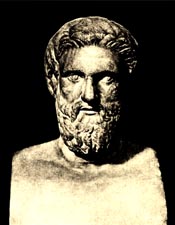Peace
, translated by Theodoridis, G., (contributor-contact-email)
Aristophanes’ Peace, an Athenian Old Comedy, was staged in 421 BC, coinciding with the Peace of Nicias, which aimed to conclude the Peloponnesian War. The play, which secured second prize at the City Dionysia, centres on Trygaeus, an Athenian farmer. He achieves the extraordinary feat of ending the war, bringing relief to farmers while adversely impacting tradesmen who benefited from the conflict.
Peace is distinguished by its blend of jubilant anticipation of tranquillity and a candid acknowledgment of missed opportunities, resulting in a resolution that is not entirely favourable for all characters. Consistent with Aristophanes’ style, the play is marked by abundant humour, absurd sequences, and sharp satire. The play also includes posthumous criticism of Cleon, a pro-war Athenian leader, reflecting Aristophanes’ persistent critique of war and its impact on society. The narrative culminates in Trygaeus’ marriage to Harvest, symbolizing the rejuvenation brought by peace.

Theodoridis, G.,
Support Open-Access:
Your contribution keeps our classical translations available to all. Every dollar helps support classics education and funds the expansion of our catalogue. Value what we do? Donate now.
File Downloads:
© Copyright, All Rights Reserved. This work may be freely reproduced, stored and transmitted, electronically or otherwise, for any non-commercial purpose. Conditions and Exceptions apply.